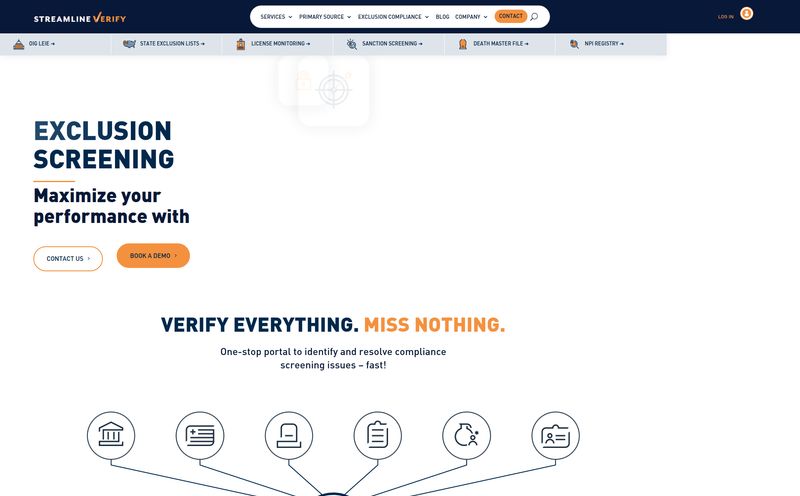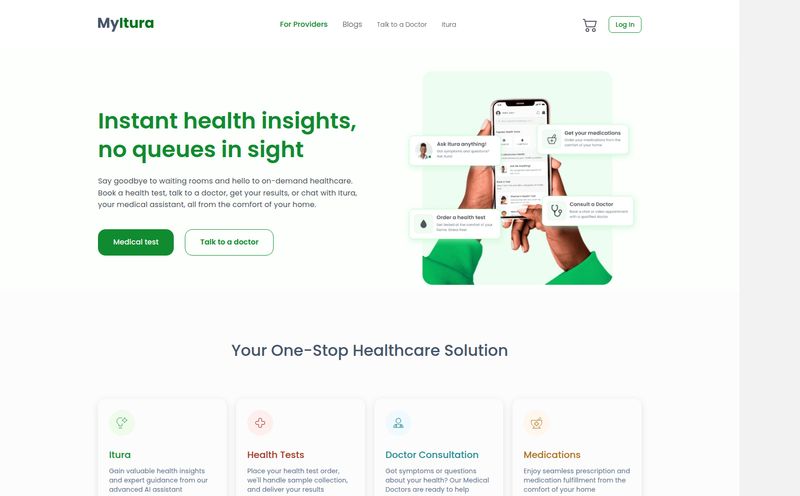Nobody likes going to the doctor for... that kind of check-up. The awkward silence in the waiting room, the clinical forms, the whole rigmarole. It's a universal experience of mild-to-moderate dread. For years, we've just accepted it as a necessary evil for responsible adulting. But what if technology could offer a first step? A private, digital once-over before you even book an appointment.
I’ve been in the SEO and digital trends space for years, and I’ve seen AI creep into everything from writing ad copy to predicting stock prices. So when I first heard about HeHealth, a platform using AI to perform a visual penis health check, my professional curiosity was definitely piqued. Is this a game-changer for accessible men's health, or just a sophisticated version of WebMD that’s destined to send us all into a panic? I had to find out.
What Exactly is HeHealth? (And Why Should You Care?)
At its core, HeHealth is an AI-driven tool designed to analyze photos of your genitalia for visual signs of STIs and other dermatological conditions. Yeah, you read that right. You use your phone's camera, the AI does its thing, and you get a preliminary assessment. The big idea is to tackle some of the biggest hurdles in men's sexual health: stigma, cost, and access.
The company talks a big game, mentioning partnerships with global organizations and even governments. This isn't just some fly-by-night app cooked up in a garage; there's a clear mission to integrate this tech into broader public health initiatives. They’re aiming to provide a discreet, affordable, and surprisingly accurate first line of defense. The goal isn't to replace doctors—and we'll get to that, trust me—but to give men a tool for early detection. And in healthcare, catching things early is pretty much everything.

Visit HeHealth
Putting it to the Test - How Does it Work?
Okay, so how does this digital doctor visit actually go down? The process is designed to be ridiculously simple. You snap a clear, well-lit picture of the area of concern, upload it securely to their platform, and the AI gets to work. It's essentially a visual pattern-recognition engine, trained on a massive dataset of medical images to spot anomalies that correspond to specific conditions. Think of it like Shazam, but for your junk. A little weird, but potentially brilliant.
HeHealth claims a pretty impressive ~94% accuracy rate for identifying visual symptoms. In the world of AI diagnostics, that's a solid number. It’s not perfect, but it's high enough to be genuinely useful as a screening tool. It’s a bit like having a specialist take a quick look and say, “Hmm, you should probably get that checked out properly,” or “That looks normal, but keep an eye on it.”
The Good, The Bad, and The Awkward
No tool is perfect, especially not in the sensitive world of healthcare. So I've broken down my thoughts into the good, and the not-so-good.
The Upside of AI-Powered Scans
The most obvious win here is accessibility. Think about someone living in a rural area, hours from the nearest clinic. Or someone with a disability that makes travel difficult. This tool brings a preliminary check-up right into their home. Then there's the discretion factor. It completely removes the social anxiety and stigma that, for better or worse, still surround sexual health. For a lot of guys, that privacy is the difference between getting checked and just... hoping for the best. And from a public health perspective, anything that encourages early detection is a massive win. An affordable, quick scan could catch something serious weeks or months before a person would have otherwise built up the courage to see a doctor.
Let's Not Get Ahead of Ourselves - The Limitations
Now for a dose of reality. The biggest, most important caveat is that HeHealth is not a doctor. Its's an algorithm. It can only identify what it can see. Many STIs, like HIV or Chlamydia in its early stages, have no visual symptoms at all. Relying solely on a tool like this could create a false sense of security. It’s a screening tool for bumps and rashes, not a comprehensive STI test. You still need blood work and swabs for a full picture.
And that ~94% accuracy? While impressive, it also means there’s a 6% chance of error. That could be a false positive, causing unnecessary panic, or worse, a false negative, where it misses something important. Finally, it requires a smartphone and a decent internet connection, which isn't a given for everyone. It’s a tool, a powerful one, but it has a very specific job and you need to understand its limits.
The Million-Dollar Question... What's the Price?
This is where things get interesting. As a blogger, one of the first things I look for is a clear pricing page. It tells you a lot about the business model and who the company is targeting. So, I navigated over to the HeHealth site to find out the cost, and... I was met with a "Page Not Found" error. A classic 404.
Now, this could just be a temporary glitch. But as an SEO guy, a 404 on a critical page like pricing always raises an eyebrow. Are they in the middle of a pricing restructure? Is it free in certain regions through their government partnerships? Is it a subscription or a pay-per-scan model? The lack of clarity is a bit of a miss. Transparency is huge in building trust, especially when you're asking people to upload sensitive photos. I hope they get this sorted out soon, because it’s a major piece of the puzzle for potential users.
Who is This Really For?
After weighing it all up, I have a pretty clear picture of the ideal HeHealth user. This isn't for the person with a confirmed diagnosis or severe symptoms—that person needs a doctor, yesterday. This is for the 'worried well'. It’s for the guy who notices a small, weird-looking bump and his mind immediately jumps to the worst-case scenario. It's for the sexually active person who wants to add an extra, simple screening step to their routine. It's for the person who is too embarrassed or anxious to make that initial appointment.
It’s best to think of HeHealth as a triage tool. In a hospital emergency room, a triage nurse quickly assesses you to decide how urgently you need care. That's what HeHealth does. It helps you decide if your next step should be waiting it out, booking a non-urgent appointment, or getting to a clinic ASAP. It’s a first step, not the final word.
My Final, Unfiltered Thoughts
So, what’s the verdict? I'm cautiously optimistic. I think HeHealth, and tools like it, represent an important direction for health-tech. It lowers the barrier to entry for taking one's health seriously. However, it comes with a giant, flashing neon sign that says: "USE WITH CAUTION AND COMMON SENSE."
My biggest lingering question is around data privacy. The company homepage has the usual promises of security and anonymity, but when you're dealing with data this sensitive, you want iron-clad assurances. Users need to be confident their information is handled with the utmost care. Assuming the privacy protocols are rock-solid and people use the tool as intended—as a preliminary screening aid, not a DIY diagnosis—I believe it could do a lot of good.
It's not a gimmick, but it's not a revolution either. It's a stepping stone. A clever and potentially very useful application of AI that could make talking about, and taking action on, men's sexual health just a little bit easier. And that's a step in the right direction.
Frequently Asked Questions about HeHealth
- Is HeHealth a replacement for a real doctor?
- Absolutely not. It is a screening tool designed for early detection of visual symptoms only. It cannot perform a full diagnosis or detect conditions that don't have visual signs. Always consult a healthcare professional for a proper diagnosis and treatment.
- How accurate is the HeHealth AI?
- HeHealth claims its AI is approximately 94% accurate in identifying the visual symptoms it has been trained on. This is not 100%, so there is still a chance of false positives or false negatives.
- How much does HeHealth cost?
- Currently, the pricing information is not clearly available on their website. The pricing page appeared to be down during our review. It may be free in some regions through partnerships or have a fee-based structure.
- Is my data and my photos safe?
- Privacy is a major concern with any health app. HeHealth states they prioritize user privacy and security, but users should always review the platform's specific privacy policy to understand how their data is stored, used, and protected.
- What if my condition doesn't have any visual symptoms?
- HeHealth will not be able to detect it. The tool is entirely reliant on visual analysis, so it cannot identify asymptomatic infections like many common STIs. Regular, traditional testing is still essential.
Conclusion
Wrapping this up, HeHealth is a fascinating piece of technology that sits at the intersection of AI, convenience, and personal health. It’s not a magic bullet that solves all the complexities of sexual healthcare, but it is a promising tool that could empower a lot of men to take that crucial first step. By offering a private, accessible way to check for visual symptoms, it has the potential to encourage earlier detection and reduce the stigma that often gets in the way of good health. Just remember its place: it’s a guide, a first look, a triage nurse in your pocket. The doctor’s office still has the final say.
Reference and Sources
- HeHealth Official Website: As the pricing page and other deep links were unavailable, users are directed to the home page for the most current information: https://hehealth.ai/


